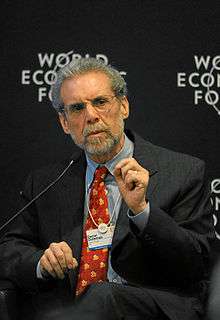
Goleman, 2011
Daniel Jay Goleman (born March 7, 1946) is an American author, psychologist, and science journalist. For twelve years, he wrote for The New York Times, specializing in psychology and brain sciences. He is the author of more than 10 books on psychology, education, science, ecological crisis, and leadership.
Quotes
- If your emotional abilities aren't in hand, if you don't have self-awareness, if you are not able to manage your distressing emotions, if you can't have empathy and have effective relationships, then no matter how smart you are, you are not going to get very far.
- Daniel Goleman (1995) cited in: John O. Dozier (2010) The Weeping, the Window, the Way. p. 130
- There are many leaders, not just one. Leadership is distributed. It resides not solely in the individual at the top, but in every person at every level who, in one way or another, acts as a leader to a group of followers — wherever in the organization that person is, whether shop steward, team head, or CEO.
- Daniel Goleman, Richard Boyatzis and Annie McKee (2002) Primal Leadership: Realizing the Power of Emotional Intelligence. p. xiii-xiv
Emotional Intelligence: Why It Can Matter More Than IQ (1995)
- Daniel Goleman (1995/1996), Emotional Intelligence: Why It Can Matter More Than IQ
- IQ is a genetic given that cannot be changed by life experience, and that our destiny in life is largely fixed by these aptitudes.
- p. xi
- In a very real sense we have two minds, one that thinks and one that feels. These two fundamentally different ways of knowing interact to construct our mental life.
- p. 8
- People who are emotionally adapt — who know and manage their feelings well, and who read and deal effectively with other people's feelings — are at an advantage in any domain in life, whether in romance and intimate relationships or picking up the unspoken rules that govern success in organizational politics.
- p. 36
- There is an old-fashioned word for the body of skills that emotional intelligence represents: character.
- p. 285
- Feelings are self-justifying, with a set of perceptions and "proofs" all their own.
- p. 295
Working with Emotional Intelligence (1998)
- Daniel Goleman (1998), Working with Emotional Intelligence
- Our emotional intelligence determines our potential for learning the practical skills that are based on its five elements: self-awareness, motivation, self-regulation, empathy, and adeptness in relationships
- p. 24
- Emotional Intelligence' refers to the capacity for recognizing our own feelings and those of others, for motivating ourselves, and for managing emotions well in ourselves and in our relationships. It describes abilities distinct from, but complementary to, academic intelligence, the purely cognitive capacities measured by IQ.
- p. 317
IQ and technical skills are important, but emotional intelligence is the sine qua non of leadership (1998)
- D. Goleman (1998), "IQ and technical skills are important, but emotional intelligence is the sine qua non of leadership". Harvard business review.
- Every businessperson knows a story about a highly intelligent, highly skilled executive who was promoted into a leadership position only to fail at the job. And they also know a story about someone with solid—but not extraordinary—intellectual abilities and technical skills who was promoted into a similar position and then soared.
Such anecdotes support the widespread belief that identifying individuals with the “right stuff” to be leaders is more art than science. After all, the personal styles of superb leaders vary: Some leaders are subdued and analytical; others shout their manifestos from the mountaintops. And just as important, different situations call for different types of leadership. Most mergers need a sensitive negotiator at the helm, whereas many turnarounds require a more forceful authority.- p. 93-94
- Effective leaders are alike in one crucial way: They all have a high degree of what has come to be known as emotional intelligence. It’s not that IQ and technical skills are irrelevant. They do matter, but mainly as “threshold capabilities”; that is, they are the entry-level requirements for executive positions. But my research, along with other recent studies, clearly shows that emotional intelligence is the sine qua non of leadership.
- p. 94
External links
This article is issued from
Wikiquote.
The text is licensed under Creative
Commons - Attribution - Sharealike.
Additional terms may apply for the media files.